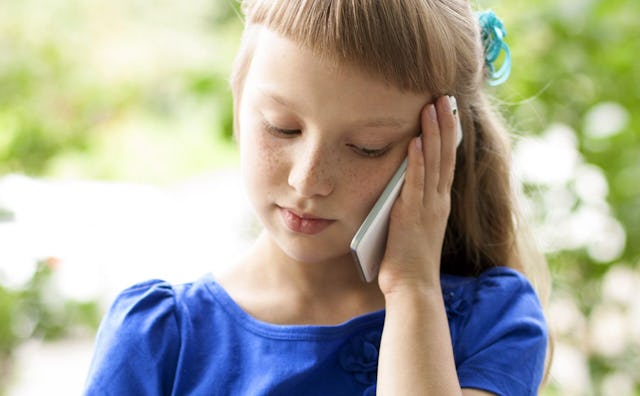Can Your Kid's Cell Phone Cause Cancer?

According to a story published last week in the New York Daily News, a new study reveals cell phones can cause cancer in adults who regularly speak on their phones while holding them up to their ears.
And while it’s troubling how the data correlate constant, low-level radiation risk with increased tumors (and other health problems) among adults who regularly, over the span of many years, use their phones in this way, it’s a bit unnerving to consider a similar impact on children.
“These data are a clear sign of the real risks this kind of radiation poses for human health,” study author Igor Yakymenko said.
Yakymenko’s meta-study—basically a study of hundreds of other studies—reveals many findings of previous researchers into how radiofrequency from your phone can damage DNA.
That damage can add up over time and cause a variety of health problems, like cancer, headaches, fatigue and even skin problems.
It’s true our kids tend to use their cell phones differently than we do. They text more than they talk. Play games on their devices. Take tons of photos. And many parents, like me, insist on the use of headsets when they are, in fact, having a “real” conversation that doesn’t involve typing on a tiny keyboard that annoyingly autocorrects every other word.
Should I be worried? Should you? These are the very same devices many of us parents have felt pressured to allow our kids to use, talk and play on during the years when their brains and bodies are still forming—when their DNA is most sensitive to the possible negative effects of radiation exposure.
As for me, I fought the whole iPhone thing. Hard. But in my town, where all the kids walk to school, it’s become a rite of passage in recent years for incoming sixth-graders to receive a cell phone. Here, it’s considered a safety issue, so kids can check in while walking home, or alert their parents when they’re running late or heading to a friend’s. Here it is a “thing.” It was truly tough to buck the tide.
My husband and I resisted for months and battled with our daughter—that is until I interviewed a prominent child psychologist who basically told me that kids live in the world, the world is a digital one now, kids want to participate in it, and the goal is to safely get to “yes” when a child requests something that makes her feel accepted into a larger peer group. Did our daughter choose to live in a zip code where every middle-schooler gets a phone, the doctor asked me? No, she did not. We made that decision for her. She just wants to experience what all her peers are doing. So how do we get to a “yes” in a way that makes both child and parents comfortable?
Eventually, reluctantly, we caved. With lots of caveats, rules and a signed contract before our daughter was allowed to get or use a phone.
I also checked out other research on the possible health risks from cell phone usage before we purchased it. This WebMD article detailed an international study that showed no link between cell phone use and brain tumors in tweens and teens. However, the researchers also pointed out that kids (and adults) use their phones much more frequently with each passing year. Additional long-term studies were needed, they urged.
Added Joel Moskowitz, director of the Center for Family and Community Health at UC Berkeley’s School of Public Health: “It will take several decades to get conclusive evidence on this.”
Yakymenko’s research suggests tumors from radiation may take up to 30 years to develop from constant cell phone use. The jury is still out on how long it may take for similar health disorders to show up in our kids.
“[Our] data were obtained on adults who used cell phones mostly up to 10 years as adults,” he said. “The situation can dramatically differ for children who use cell phones in childhood, when their biology is much more sensitive to hazardous factors, and will use it over life.”
We already restrict our daughter’s use of her phone, and, as I mentioned, insist she use a headset. With this new information, my knee-jerk reaction is to take it away, despite the obvious differences between how my generation long used their cell phones and how my daughter and her friends use theirs. However, now that the genie is out of the bottle—she’s had an iPhone for nearly a year—I’m not so sure I can. I’m not sure what to think.
I know I’ll be keeping an eye on this.
This article was originally published on